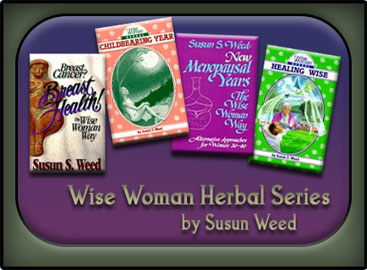Be Your Own Herbal Expert
Part 3
- Know Your Plants -
Susun S Weed c. 2002(part 1 - part 2 - part 4 - part 5 - part 6 - part 7 - part 8)
Herbal medicine is the medicine of the people. It is simple, safe, effective, and free. Our ancestors knew how to use an enormous variety of plants for health and well being. Our neighbors around the world continue to use local plants for healing and health maintenance, and you can too.
In your first lesson, you learned how to "listen" to the messages of plant's tastes. And you discovered that using plants in water bases (as teas, infusions, vinegars, and soups) -- and as simples -- allows you to experiment with and explore herbal medicine safely.
In your second lesson, you learned about herbs for teas and how to preserve and use their volatile oils. You leaned about vitamin- and mineral-rich herbal infusions, and how to use them to promote health and longevity. And you continued to think about using herbs simply.
In this lesson you will explore the differences between nourishing, tonifying, stimulating/sedating, and potentially-poisonous plants. You will learn how to prepare and use them for greatest effect and most safety.
All Herbs Are Not Equal
All herbs are not equal: some contain poisons, some don't; some of the poisons are not so bad, some can kill you dead. I divide herbs into four categories for ease in remembering how (and how much) to use. Some herbs nourish us, some tonify; some bring us up or ease us down and some are frighteningly strong.
Nourishing herbs are the safest of all herbs. They contain few or no alkaloids, glycosides, resins, or essential oils (poisons).
Nourishing herbs are eaten as foods, cooked into soups, dried and infused, or, occasionally, made into vinegars.. They provide high-level nutrients, including vitamins, minerals, trace minerals, proteins, phytoestrogens and phytosterols, starches, simple and complex sugars, bioflavonoids, carotenes, and essential fatty acids (EFAs).To take this eight part course and get the full content join
Personal Mentorship with Susun Weed at the
Herbal Medicine Mentorship level – click here to get the details
If you're already a member Click here to read the rest of Part Three
If you want to be your own herbal expert - consider Studying with Susun via a correspondence course!
This year, Susun is offering a special 8-month plan - Learn More by clicking here
Note: close this window to return to where you came from.
by Susun S. Weed
Introduction by Jean Houston.
Superb herbal in the feminine-intuitive mode. Complete instructions for using common plants for food, beauty, medicine, and longevity. Seven herbs -- burdock, chickweed, dandelion, nettle, oatstraw, seaweed, and violet -- are explored in depth.
A Special Tenth Anniversary edition of this classic herbal, profusely illustrated. 312 pages.
Retails for $21.95
Read a Review
Order HEALING WISE in our BookshopI just started reading your book, Healing Wise. Your humor and approach to life seem so "down-to-earth", just like your favorite powerful weeds. Thank you for sharing and nourishing! ~ Diane

